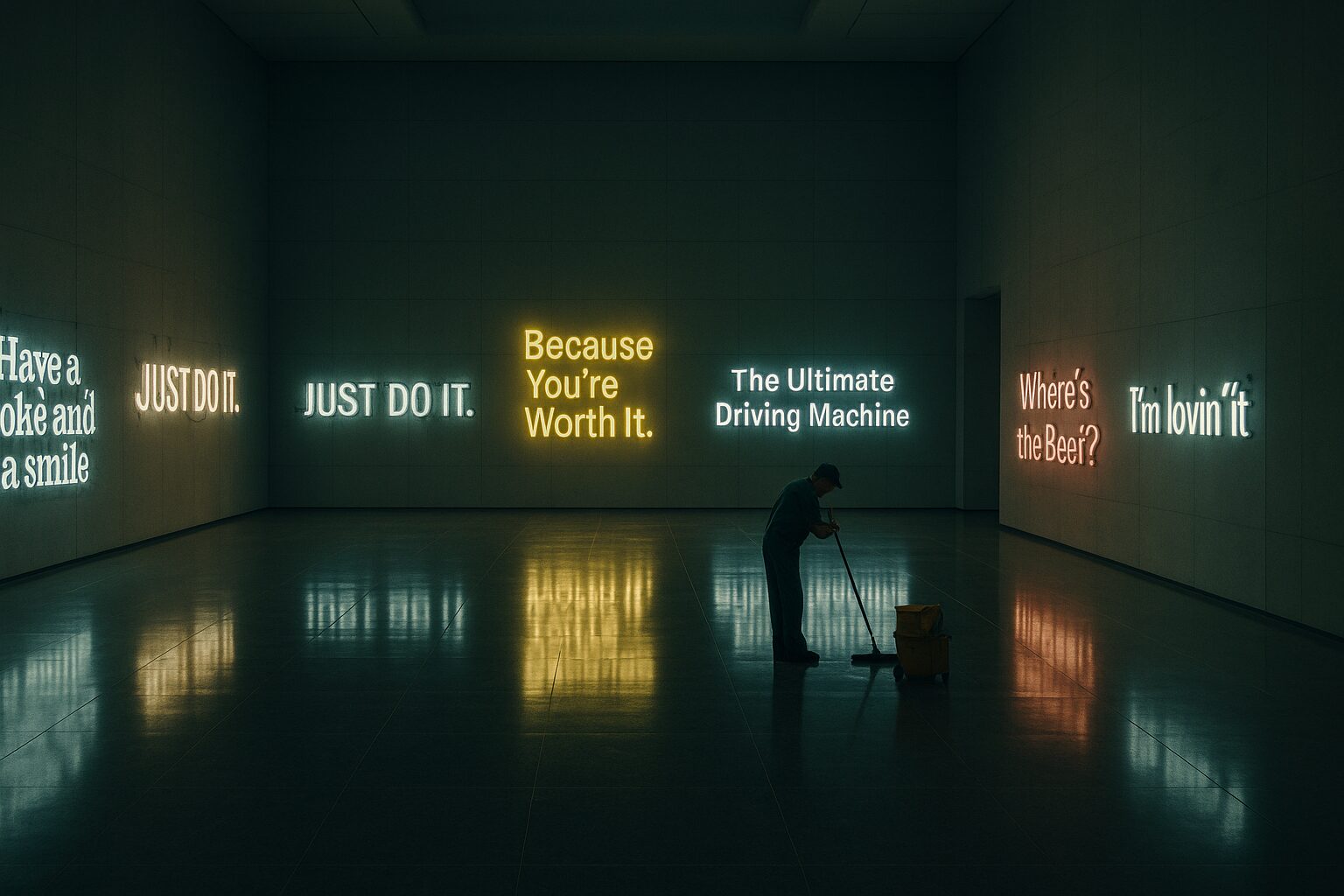It doesn’t start with failure. It starts with alignment.
The numbers look fine. The dashboards hum. The purpose slides sparkle under soft fluorescent light. Everyone nods. No one notices that belief has quietly left the room.
The new faith is performance. As long as engagement goes up, conviction doesn’t matter.
Once, belief was dangerous, unpredictable, human. When Nike stood with Kaepernick, the stock dropped, and then faith turned into revenue. When Oliviero Toscani made a nun kiss a priest for Benetton, the Vatican protested, but the world paid attention. Even Dove’s “Real Beauty” campaign, clumsy as it was, came from a genuine hunger to mean something. Now belief is a line item. It lives in workflow, optimized for tone, calibrated for brand safety.
In meetings, no one argues anymore. They align. Alignment feels safe, efficient, almost moral. It’s also what happens right before rigor mortis.
Purpose has become hygiene, something you repeat so the air doesn’t smell of profit. It lives in bullet points now: We care. We listen. We give back. Every brand says it. Coca-Cola says it between product launches. Unilever says it in PowerPoint. Meta says it through a new privacy feature that no one trusts. No one asks if it’s true.
You can feel it in the language. The verbs are softer, the claims conditional. Everything supports, empowers, strives. Words that sound good because they mean nothing.
Once, brands mistook adrenaline for faith. They confused conviction with courage, noise with vision. But at least they believed, even when they were wrong. Even Pepsi, with its tone-deaf protest ad, believed in the illusion of impact.
Now belief has been replaced by governance. Values live in spreadsheets; ethics has a compliance team. At Google, it’s a slide called “AI Principles.” At McKinsey, it’s a framework called “Trust by Design.” At Cannes Lions, they give it a trophy and call it “Brand for Good.”
Somewhere between pride and exhaustion, someone still believes, not in the brand, but in the work. The strategist who still writes “why” in lowercase. The designer who spends an hour finding a blue that feels honest. The copywriter who can’t make peace with “authenticity” as a deliverable. They’ll lose, of course. But belief doesn’t need victory, just oxygen.
Inside the glass rooms of Accenture Song, a Notion page glows in the half-light. Someone reads the mission line: We exist to make life better. No one laughs, no one disagrees. They just adjust the font size and move to the next section. Belief, now, is typography.
The real religion is predictability. No miracles, no heresy, no risk. Just process.
We don’t worship meaning anymore; we worship consistency. Executives still talk about culture. They call it “our DNA,” as if personality could survive quarterly updates. But culture, stripped of friction, becomes choreography. And choreography always looks beautiful, right up until it repeats itself to death.
Consumers have learned the pattern. They scroll past the virtue. They don’t hate brands; they just don’t believe them. They know empathy can be scheduled, and sincerity has a social media calendar. Every apology is a post, every scandal a chance for “reconnection.” When Balenciaga apologizes, when Starbucks pauses to “listen,” when McDonald’s releases its annual sustainability statement, everyone already knows the lines.
Still, somewhere, belief flickers. In the small rebellion of a color grade, in a line that escapes the legal review, in an art director who still cares about truth. But it doesn’t last. Belief isn’t efficient. Conviction isn’t scalable. Doubt doesn’t fit in a KPI.
So, belief gets quietly deleted, replaced by tone. Tone is cheaper. Tone performs. Tone never argues.
Everything still works. The dashboards smile. The purpose decks update overnight. The same people who write about “brand humanity” in Harvard Business Review still ask AI to generate empathy at scale.
And somewhere, between a podcast on authenticity and a LinkedIn post about accountability, the last trace of faith gets reformatted into content.
Not dead. Just optimized.





